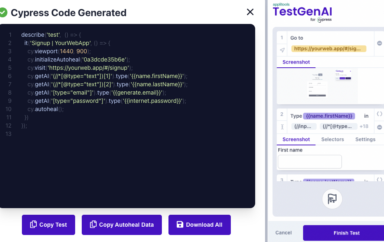Forrester’s August 2023 report: The State Of TuringBots, 2023 examines the impact of AI on the Software Delivery Lifecycle (SDLC) and how organizations can effectively add this technology to their overall strategy. The findings were compelling and critical for modern businesses to understand so that they can adapt and stay ahead of the curve. Let’s take a look at some of the key points.
Per the report, many organizations are grappling with the challenge of keeping up with business changes due to sluggish software development processes. The emergence of Generative AI has ushered in a new era of AI-assistive software, impacting industries irrespective of their SDLC maturity or existing AI utilization.
Forrester coined the name for this software as “TuringBots” which they now define as:
“AI-powered software that augments application development and infrastructure and operations (I&O) teams’ automation and semiautonomous capabilities to plan, analyze, design, code, test, deliver, and deploy while providing assistive intelligence on code, development processes, and applications.”
Forward-thinking organizations are embracing cutting-edge technologies like TuringBots to stay ahead. With GenAI revolutionizing numerous AI applications, the anticipated timeline for the development and impact of TuringBots has been accelerated to two to five years instead of a decade. This shift has brought about a deeper comprehension of the immense potential held by TuringBots.
Today, businesses rely on software as the backbone of digital operations, representing their strategies, processes, products, and services. However, many organizations need help in software development to match the rapid pace of business evolution and innovation. The report laid out common challenges like:
- Many developers still rely on manual testing despite automation advancements in the software development lifecycle. The lack of automation in various stages is attributed to tool complexity, skill gaps, and slow organizational modernization adoption.
- Lacking product management skills. The main hurdle in agile proficiency is the absence of business-led product ownership and management.
- IT that is resistant to change.
Per the report, academia and the tech industry have long aimed to streamline software development. With GenAI’s TuringBots, Forrester states that vendors accelerate product delivery by automating tasks and enhancing user experiences. The report recommends that it is time for tech leaders to empower their teams with TuringBots for maximum efficiency and take advantage of these benefits:
- TuringBots assist in development processes, though not fully mature for complete SDLC support.
- Easy access to project information is crucial for teams, covering project status, test completion, code check-ins, and more. Developers can save time by using Coder TuringBot plug-ins in IDEs like Tabnine or GitHub Copilot.
- These tools provide quick access to code snippets and information, helping to generate code efficiently through natural language chat.
The impact of TuringBots is significant across all industries, driving the transformation into digitally competent businesses. While the speed of adaptation varies, understanding and managing TuringBots is crucial for technology leaders. It is essential to swiftly grasp the key governance and best practices to mitigate risks related to insecure code, performance issues, and user experience.

